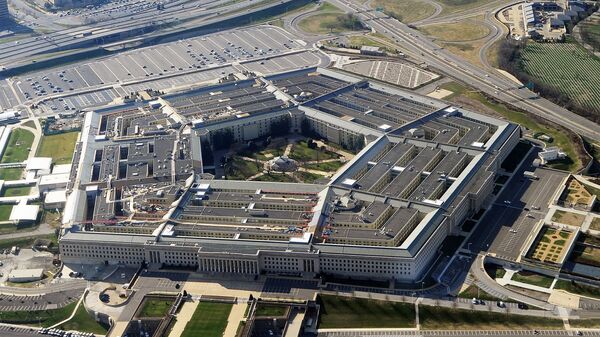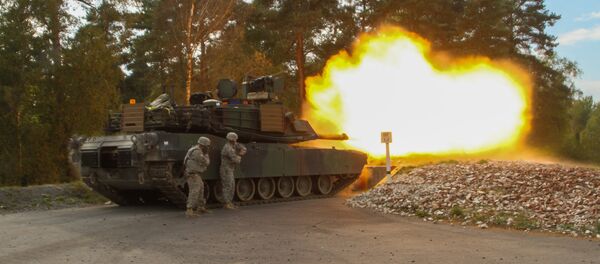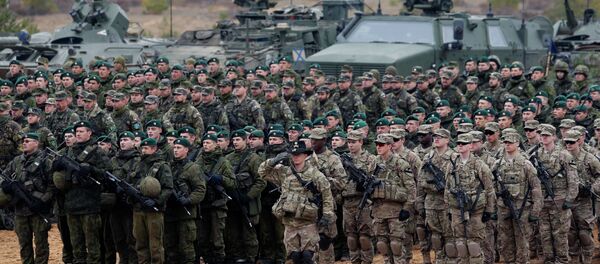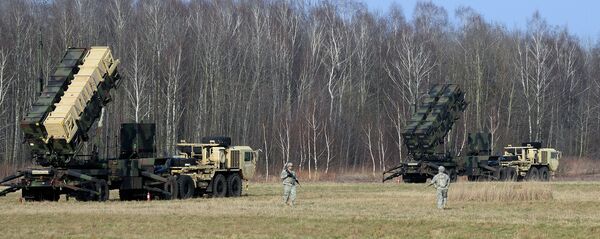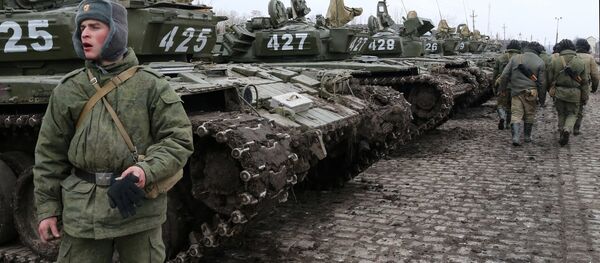The spending increase in Europe, Carter explained, is part of a "strong and balanced approach to deter Russian aggression."
"We haven't had to worry about this for 25 years, and while I wish it were otherwise, now we do," the defense secretary added, weeping crocodile tears.
According to The New York Times, the European spending increases imply a significant increase in US heavy weapons and armored vehicles in the countries of Central and Eastern Europe. The US, it's worth recalling, already has 65,000 troops in Europe, and has been stockpiling additional resources in Eastern Europe over the past year.
Moreover, last week, US European Command (EUCOM) updated its theater strategy, formalizing the combat command's top priorities, mission, and vision. In the new plan, Russia is portrayed as the main threat –to be deterred and contained in Europe. The update, EUCOM's official blog revealed Tuesday, shifts the US strategic focus on a "revanchist Russia."
"Russia is presenting enduring challenges to our allies and partners in multiple regions; therefore, it is a global challenge that requires a global response," the updated doctrine reads.
To start with, Viktor Kremeniuk, the deputy director of the Institute of the US and Canada at the Russian Academy of Sciences, suggested that the events taking place in Washington signal a very important process, namely — the revitalization of the American military industrial complex.
"The United States is reaching the completion of the restoration of that model of development –social, economic and political, which existed in America after the Second World War and throughout the Cold War. This model, in particular, envisions the development of new technologies through military spending."
"After the collapse of the Soviet Union," the analyst recalled, "this model faced severe criticism in America because of the lack of an external enemy. But now the situation has come full circle. The country's elites are simply ecstatic that Russia has once again become the enemy. It works to unleash very powerful forces in the country –economic, technological and administrative, and politicians cannot help but nod with approval."
Ultimately, Kremeniuk suggests, Carter's speech before the Economic Club of Washington, where he discussed the proposed new budget, "says that America's elite has finally come to a decision: Russia had not become the US's ally or partner, and its behavior in the international arena is unacceptable to Washington. This, according to the US government's logic, means that it is necessary to prepare for a possible armed conflict."
Asked whether all of this signals a new arms race in Europe, the analyst suggested that for now, the answer is 'not yet'. "For the race to start, it's necessary to approve the increased spending in the federal budget. Barack Obama is unlikely to be able to get it done. However, he will try, no doubt, to bolster the position of Democratic presidential candidate Hillary Clinton. Moreover, it's clear that this is a signal which the Republicans have picked up on as well."
Washington, the analyst notes, is confident that the rules of this new game favor them. "It's important to understand that the combined GDP and the US and the European Union is about 20 times greater than that of Russia. America's military budget alone exceeds the total military expenditures of the next eight countries – China, Russia, Saudi Arabia, France, Britain, Germany, Japan and India, combined."
For his part, Sergei Markov, the director of the Moscow-based Institute of Political Studies, emphasized that Secretary Carter's speech "indicates that the arms race will accelerate, but does not necessarily imply the use of weapons. As we see today, the main attacks against Russia are applied not on the battlefield, but using the instruments of hybrid warfare, including blows against the economy, finance, technology and information."
At the same time, the political scientist noted, "it's vital to understand that an arms race would benefit the American economy. The US military-industrial complex is very skilled at creating new technologies, and works to ensure the transfer of these technologies from the military industrial complex to the civilian economy. As a result, large investments in the US military-industrial complex are one of the most effective ways to stimulate economic growth."
"For Russia, this means increased military tension in northeast Europe. However, this is not a region facing a level of instability which could easily lead to an outbreak of military conflict. Consequently, tensions here, unpleasant as they may be, should not be taken as a serious threat. A much more dangerous situation presents itself on Russia's southwestern borders – in Ukraine, Moldova, and further south, in Georgia and the Caucasus. This is where efforts should be made to neutralize threats, including those from the United States."
For his part, Yuri Rogulev, the director of the Center for the Study of the USA at Moscow State University, suggested that it's highly likely that Secretary Carter's announcement was made for internal consumption, in view of the American election cycle.
Recalling the tried and true American political tradition of working to convince voters that the party in office is doing an adequate job protecting America against 'Russian aggression', the analyst noted that ultimately, "Carter needs to demonstrates that the Democrats have taken the initiative on military spending."
"The missile defense program is an explicit attempt to accelerate the arms race. Washington's expectation is that Moscow will either lack the resolve to respond with the deployment of their own costly missile defense program, or find the resolve, which will lead to the [financial] ruin of the state."
"In this situation," Rogulev emphasizes, "Russia must look at its options for an asymmetrical response – this applies both to missile defense, and to US plans to strengthen its military presence in Europe more broadly."

